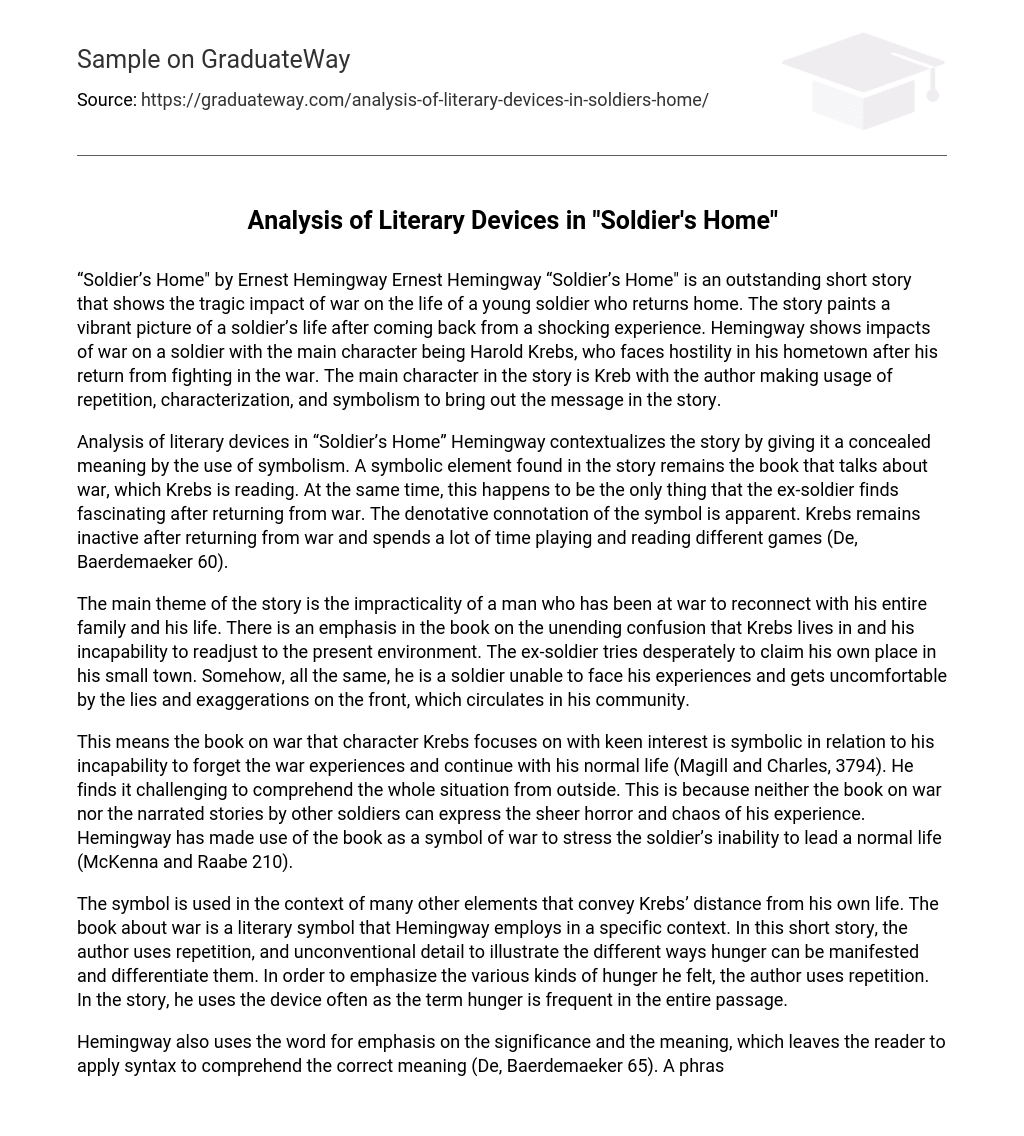“Soldier’s Home” by Ernest Hemingway Ernest Hemingway “Soldier’s Home” is an outstanding short story that shows the tragic impact of war on the life of a young soldier who returns home. The story paints a vibrant picture of a soldier’s life after coming back from a shocking experience. Hemingway shows impacts of war on a soldier with the main character being Harold Krebs, who faces hostility in his hometown after his return from fighting in the war. The main character in the story is Kreb with the author making usage of repetition, characterization, and symbolism to bring out the message in the story.
Analysis of literary devices in “Soldier’s Home” Hemingway contextualizes the story by giving it a concealed meaning by the use of symbolism. A symbolic element found in the story remains the book that talks about war, which Krebs is reading. At the same time, this happens to be the only thing that the ex-soldier finds fascinating after returning from war. The denotative connotation of the symbol is apparent. Krebs remains inactive after returning from war and spends a lot of time playing and reading different games (De, Baerdemaeker 60).
The main theme of the story is the impracticality of a man who has been at war to reconnect with his entire family and his life. There is an emphasis in the book on the unending confusion that Krebs lives in and his incapability to readjust to the present environment. The ex-soldier tries desperately to claim his own place in his small town. Somehow, all the same, he is a soldier unable to face his experiences and gets uncomfortable by the lies and exaggerations on the front, which circulates in his community.
This means the book on war that character Krebs focuses on with keen interest is symbolic in relation to his incapability to forget the war experiences and continue with his normal life (Magill and Charles, 3794). He finds it challenging to comprehend the whole situation from outside. This is because neither the book on war nor the narrated stories by other soldiers can express the sheer horror and chaos of his experience. Hemingway has made use of the book as a symbol of war to stress the soldier’s inability to lead a normal life (McKenna and Raabe 210).
The symbol is used in the context of many other elements that convey Krebs’ distance from his own life. The book about war is a literary symbol that Hemingway employs in a specific context. In this short story, the author uses repetition, and unconventional detail to illustrate the different ways hunger can be manifested and differentiate them. In order to emphasize the various kinds of hunger he felt, the author uses repetition. In the story, he uses the device often as the term hunger is frequent in the entire passage.
Hemingway also uses the word for emphasis on the significance and the meaning, which leaves the reader to apply syntax to comprehend the correct meaning (De, Baerdemaeker 65). A phrase such as, he was starving in a simple way, means that he feels hungry because he hasn’t eaten any food. Hemingway talks about hunger as being simple because its connotation is denotative of the word. In the book the work, the other kinds of hunger are at times intricate to decipher. In the instance that Hemingway questions Hadley about whether he is hungry, Hadley replies that there are various kinds of hunger.
He says that spring has a diversified hunger, but that was in the past as memory is no hunger. There is repetition of the term hunger as evident in unconventional settings when Hemingway tells Hadley to define hunger. The story’s main character is Harold Krebs. He returns from the First World War and moves back to his parent’s house to think about his plans in the future. An exciting characteristic in Krebs is his reactions to the world that surrounds him, when he comes back from war.
He lives in Oklahoma, which is the setting of the story as he is enlisted to work for the marines in the year 1917 and does not return to America until after two years (Hemingway 300). Hemingway depicts a chronologically prearranged piece, as all the events are sequenced at a precise time that Krebs has returned from war. There is reference made about the past, which is a general idea on what is in Krebs mind. The story is written in the third person with a limited omniscient in that the narrator concentrates on the struggles experienced by one character, but mentioning other characters in the story (Hemingway, 287).
The narrator paces the reader in the environment and the society associated with Kreb. This allows an individual to feel that he does not understand the long-term war effects. Soldiers Home provides a good read on the tragic effects of war experienced by a young man. The author uses repetition efficiently to stress his message in the short story. Other literary devices such as symbolism are evident, which brings out the theme in the story. The aspect of characterization is also vital because the reader can understand the characters in the whole story.
Works Cited De, Baerdemaeker R. “Performative Patterns in Hemingway’s “soldier’s Home”. ” The Hemingway Review. 27. 1 (2007): 55-73. Print. Hemingway, Ernest. Soldiers Home. English 1302 Blackboard Course. South Plains College. Spring:2010. Print. Magill, Frank and Charles, May. Masterplots II: Short Story Series. Pasadena, Calif: Salem Press, (2004). 3793-3795 Print. McKenna, J J, and D M. Raabe. “Using Temperament Theory to Understand Conflict in Hemingway’s “soldier’s Home”. ” Studies in Short Fiction. 34. 2 (1997): 203-214. Print.





